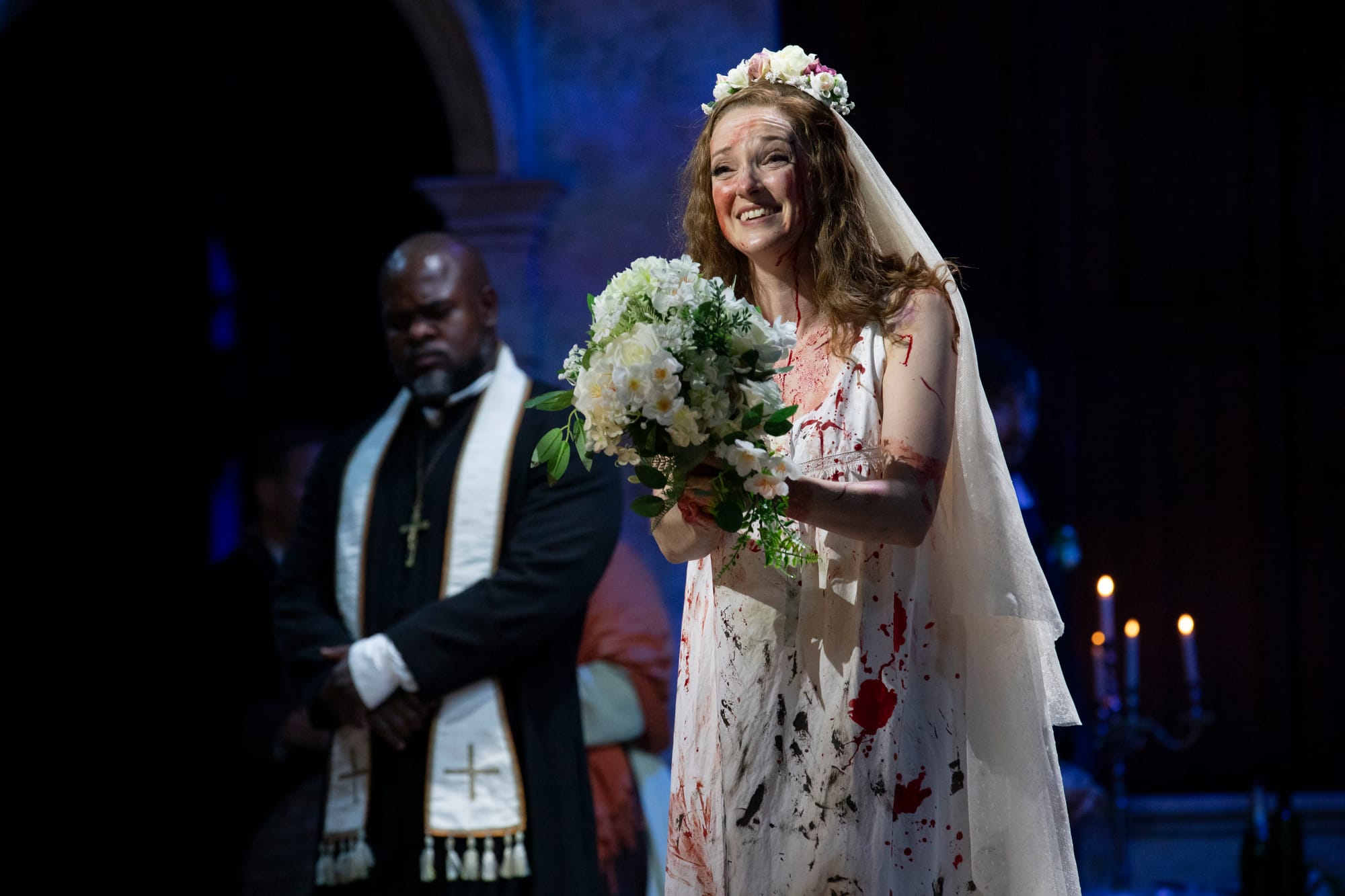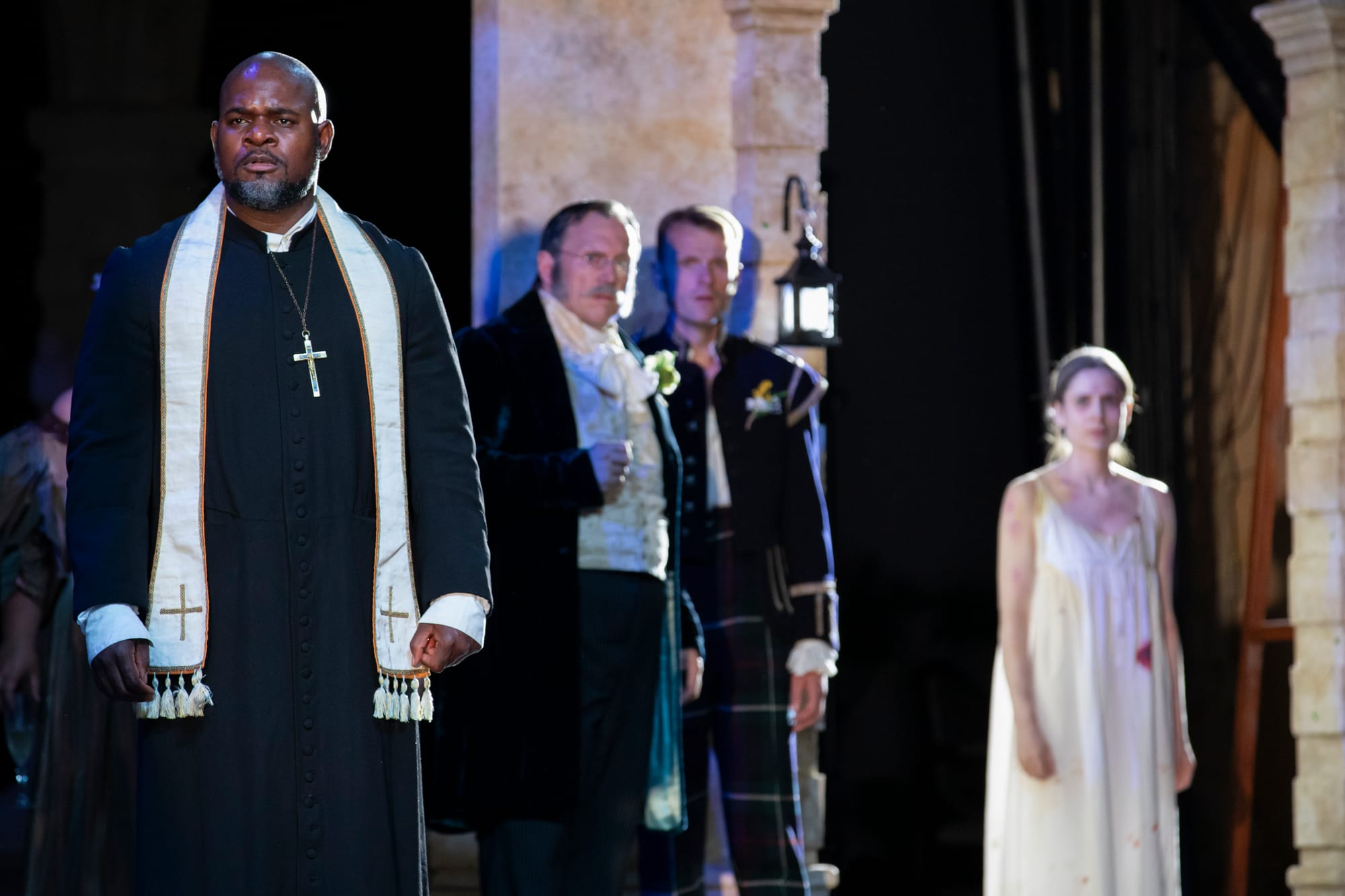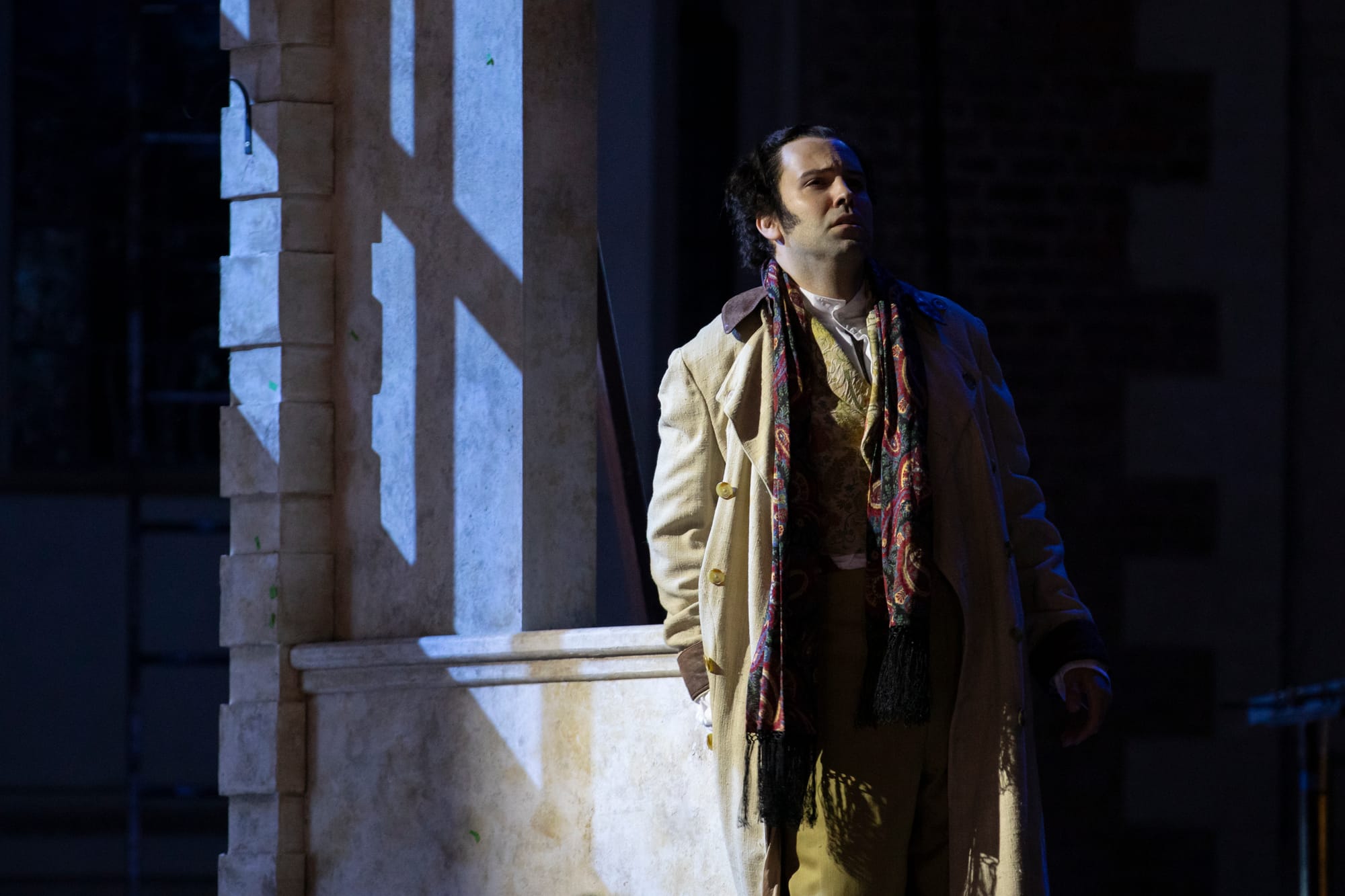Lucia di Lammermoor at Opera Holland Park
This is a must: Jennifer France is simply superb

After a couple of Opera Rara Donizetti song posts (Volume 1; Volume 4), and previous posts on the release of Donizetti's Three Queens, Il Paria and L'ange de Nisida, plus a live Elixir at ENO , it's time for one of that composer's most famous operas: the 1835 tragedy Lucia di Lammermoor. First performed at Naples and to a libretto by Cammarano (after Sir Walter Scott's novel), it is a true Gothic tragedy Forced marriages rarely work in opera (or elsewhere, probably), but this one goes catastrophically wrong, culminating in the most famous Mad Scene of them all. And for all of its popularity, I'm amazed to find the last time I saw it live was in Alden's very dark staging at ENO in 2008.
There could be no more apt setting for Lucia than OHP; the set almost makes itself. And yet having the orchestra in the centre produces problems - singers at the back has to fight to be heard, despite the reduced orchestration (Tony Burke for Pocket Productions).
At the centre of the opera is the titular Lucia, whose enforced manage to Arturo though the machinations of her brother Enrico (while she loves Edgardo) is a the crux of her fatal breakdown. Lucia and Edgardo meet, in the second scene, at a "haunted fountain". And it is here we meet the ghost; in the libretto, Lucia tells Alisa she had seen the phantom previously. In his production, the ghost wanders in from Holland Park, sits with the audience briefly before silently stalking the stage, time and time again throughout the evening. (the legend is that Ravenswood killed his lover - who had betrayed him - and that the spirit of the deceased lives in the fountain; it's about as Gothic a story as you can get).
Conductor Michal Papadopoulos really knows the score inside out, and keeps it moving. There was the odd moment that did not work (when we heard of Enrico's "burning rage," there was precious little indication of that from the band)
The evening (not the first night) took a while to settle; the chorus and orchestra weren't completely together in the earlier moments. The opening scene centres on Normanno (David Webb) and Enrico (Morgan Pearce), both in good voice (if in need of a touch just moe projection from Webb). But the second we headed to the fountain (near Ravenswood Castle in the stage directions), the evening went up a whole collection of notches. From the off, Jennifer France owned the stage; her "Quando, rapito in estasi" a masterclass in bel canto. This began an assumption that will live long in the memory; here is a character who develops, whose dissembling is gradual, and all the more powerful for that deconstruction of persona. Feance's second act "Soffiva ned piano" gave a hint of what was to come, but when it came to the final act, it was impossible to take one's eyes off her. This was a reading considered from the ground up, every semiquaver fully assimilated. She took her time, allowing unaccompanied cries of "Edgardo" to resonate; the silent audience allowed her to provide the quietest of pianissimi. And her velocity, not only of voice but also of stage movement, was incredible; not as incredible as the fact France can do both at the same time,, maintaining a seamless stream of notes as she physically runs. The audience, like the stage characters, could only watch in astonishment (albeit for different reasons!).
A quick note: no glass harmonica in the Mad Scene, but a terrific flute instead from Fiona Kelly.
France is already making a huge mark on the scene; this consolidates it. I had the pleasure of interviewing France for Opera Now (see the May/June 2021 edition). In it, she speaks of the importance of saturating oneself in a character, of going way further than just the dots. And this Lucia is poof positive she practices what she preaches.
But the second scene of the first act also brought a pleasant surprise. I was just as well France was so strong; as mezzo Charlotte Badham, who sang her assistant, Alisa, is a real find. So often in opera, heroines need a confidante, and here she was, so involved in her mistress' story both dramatically and vocally. Badham has a fabulous voice (no problems projecting), and also a most expressive face. In fact, her acing across the board was splendid. Many of he previous roles have been for OHP (there are mote at the RNCM before that) - there's a great career ahead here.
The other star was the priest, Raimondo, here taken by the exraodinary Blaise Malaba (High Priest of Baal in Nabucco at Covent Garden; the Doctor in Verdi's Macbeth, Zuniga in Carmen, Montano in Otello, also at Covent Garden, Jette Parker concert 2022 and Second Priest, Handel Susanna at Linbury), His voice is resonant, clear, and powerful, his stage presence perfect.

The Edgardo was José de Eça, strong and a perfect foil for France's Lucia, their duet at the close of the first act effective and given extra momentum via Papadopoulos' conducting. Morgan Pearce kept up the good work he had set out early on as Enrico, but it is to.Edgardo the final scenes fall. The grave at the front of the stage houses both Lucia and Edgardo; a moment that is both narrowing and exquisitely touching. Tear Joseph Buckmaster was a convincing Arturo.

Donizetti's writing in the second act is miraculously varied (the second scene not only includes a chorus but also a sextet); for all that this is Lucia's show, and it was here that Opera Holland Park reminded us of its strengths as an ensemble.
A great evening. Donizetti's Lucia is intense, an intensity that hardly drops in its three-hour drain (including interval - we finished just shy of 1030 pm). With the City of London Sinfonia playing they hearts out for Papadopoulos (apart from that flute, some fabulous hot playing from horn players Alexei Watkins and Tim Caster), this is a must.
